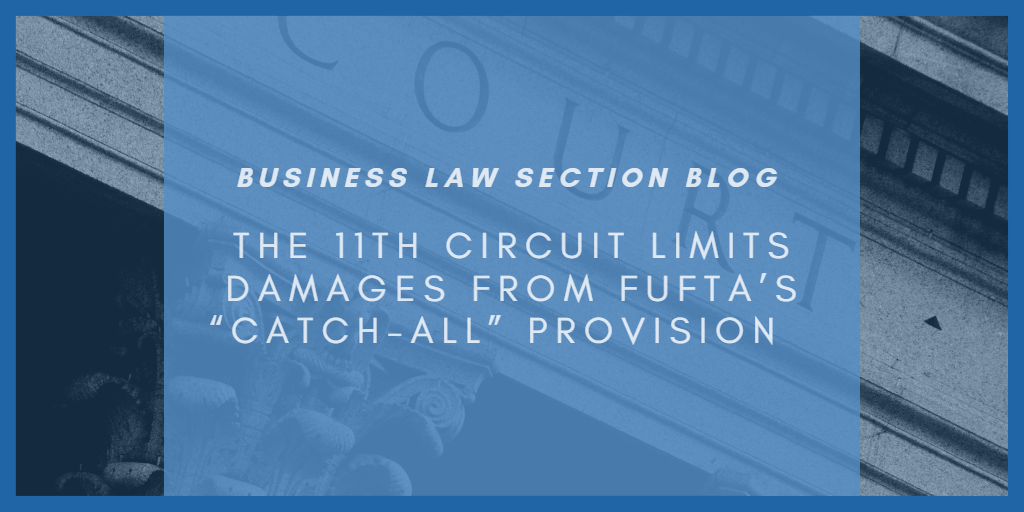By Michael Kolcun, Adams and Reese LLP
In a case of first impression, SE Property Holdings, LLC v. Welch, __ F.4th __, 2023 WL 2878735 (11th Cir. April 11, 2023), the Eleventh Circuit held that the “catch-all” remedies provision in the Florida Uniform Fraudulent Transfer Act (“FUFTA”), Fla. Stat. § 726.101 et seq., neither allows the recovery of money damages against a transferor nor an award of punitive damages and attorneys’ fees.
SE Property Holdings involved a corporate judgment debtor’s transfer of settlement proceeds (obtained in an unrelated case) to its principal’s attorneys for handing a personal bankruptcy matter. After a series of dispositive motions winnowed-down the case, the primary claim remaining was for money damages, punitive damages, and attorneys’ fees against the transferor/debtor under FUFTA’s “catch-all” provision at section 726.108(1)(c)3., which allows a creditor to obtain “[s]ubject to the applicable principles of equity and in accordance with applicable rules of civil procedure … [a]ny other relief the circumstances may require.” In its order granting the transferor/debtor’s motion for summary judgment in all respects, the U.S. District Court for the Northern District of Florida found FUFTA’s “catch-all” provision was narrowly interpreted in Freeman v. First Union Nat’l Bank, 865 So.2d 1272 (Fla. 2004), and in light of no other support, held it was unlikely that Florida’s Supreme Court would authorize such awards.
On appeal, the Eleventh Circuit first noted its obligation to adhere to case precedent from Florida’s highest court and the statute itself when deciding such novel questions under Florida law. After dissecting various other provisions to glean the legislative intent of FUFTA, the Eleventh Circuit initially tackled the question of whether the “catch-all” provision permits a creditor to recover a money judgment against a transferor, or in essence as the creditor argued on appeal, a second judgment against the transferor/debtor for a FUFTA violation. It found the plain language of the statute and relevant Florida case law amount to a “strong indication” that Florida’s Supreme Court would not allow an award of money damages against a transferor under FUFTA. First, the Eleventh Circuit found various other FUFTA provisions provide remedies to a creditor, and because money judgments are only specifically mentioned with respect to transferees, it implies the exclusion of that remedy against a transferor as a matter of statutory construction. It also found the language of the “catch-all” provision, that only references equitable remedies, precluded the availability of a money judgment. Second, the Eleventh Circuit relied heavily on the Florida Supreme Court’s language in the Freeman decision, which reasoned that FUFTA’s “catch-all” provision was only intended to facilitate the use of other remedies in the statute—not to create new or independent causes of action, which a contrary conclusion allowing for a money judgment against a transferor would otherwise accomplish. In doing so, the Eleventh Circuit also rejected two Florida DCA cases pre-dating the principles expounded by the Florida Supreme Court in Freeman.
The Eleventh Circuit held FUFTA’s “catch-all” provision does not allow for recovery of punitive damages either, primarily because punitive damages are neither mentioned in the statute nor considered as one of the equitable remedies that the statute does mention is available. Although it noted a divide among states as to whether their versions of the Uniform Fraudulent Transfer Act allow a creditor to recover punitive damages, the Eleventh Circuit reasoned based on the statutory language of FUFTA and the Freeman decision that Florida’s Supreme Court would side with the states finding that punitive damages are not recoverable.
Finally, the Eleventh Circuit similarly held the Florida Supreme Court would not find FUFTA’s “catch-all” provision permits the recovery of attorneys’ fees, as fee-shifting is absent from the statute and in light of the narrow interpretation of FUFTA in Freeman.
The Eleventh Circuit’s decision in SE Property Holdings is significant because it is the highest court to address whether money damages against a transferor, punitive damages, and attorneys’ fees are available under FUFTA’s “catch-all” provision, which no doubt will be deemed persuasive throughout Florida’s state courts unless and until the Florida Supreme Court steps in.

